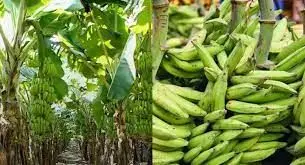- Home
- /
- Plantains, bananas to...

Improved production and exportation of plantains and bananas can increase Nigeria’s GDP. Dr Semeton Amosu, a Fruit Research Scientist at the National Horticultural Research Institute (NIHORT) Ibadan, made the declaration on Tuesday in Ibadan. He said an increase in production could also lead to reduction in the importation of plantains and banana. He said that […]

Improved production and exportation of plantains and bananas can increase Nigeria’s GDP.
Dr Semeton Amosu, a Fruit Research Scientist at the National Horticultural Research Institute (NIHORT) Ibadan, made the declaration on Tuesday in Ibadan.
He said an increase in production could also lead to reduction in the importation of plantains and banana.
He said that development of plantain and banana value chains could lead to the creation of more employment opportunities and overall improved livelihoods for stakeholders.
Amosu highlighted the need for awareness creation on the potentialities of these crops, describing them as capable of improving the livelihoods and income generation of farmers.
He advocated capacity building for farmers and other stakeholders on improved production technologies of the crops.
The fruits scientist also called for the creation of good market linkages to support small and medium scale farmers involved in the production of banana and plantain.
Amosu advised farmers to increase the production of these crops in all the growing regions and acquire the knowledge of Good Agricultural Practices (GAP) for both commodities from the institute.
“There is the need for the creation of a controlled market system so that farmers can have readymade markets with a strong distribution network for their produce.
“Farmers should also major on processing and value addition to reduce post-harvest losses to the barest minimum,’’ he said.
He added that the production of the crops could be in two folds: production of suckers (Planting materials) and production of plantain/banana fruits.
According to the scientist, the production of the fruits is achieved through orchard establishment using different plant density with the global GAP for plantain and banana.
Amosu stated that the preservation of the crops could be best achieved through processing and value addition.
“Moreover, NIHORT has developed and disseminated to farmers plantain and banana products including 'SoyaMusa’ (a baby food that combines soybean and plantain), plantain/banana flour, plantain/banana starch, plantain/banana chips and banana yoghurt.
“A new project has just been approved to look into the possible use of plantain or banana peels for the production of paper, mats, and belts, among others,’’ he said.
The fruit scientist described plantain as good source of minerals and Vitamin C, adding that including them as part of a varied diet could help support the immune system.
“Heat and light can destroy Vitamin C, so, when cooking plantains, do not allow the water to boil and cook them only for a short period.
“They contain Vitamin B6, which is good for a healthy heart and mind. Vitamin B6 performs a wide variety of functions in the body,’’ he said.
Amosu also told NAN that flours made from unripe banana had been proven to be highly effective in improving insulin sensitivity and reducing some medical conditions linked with the liver and kidney.
“Eating banana regularly contributes to daily potassium requirements to keep blood pressure down and prevent further complications like strokes and kidney diseases.
“The anti-oxidant and anti-inflammatory property in banana peels has made them popular in folk medicine for wounds treatment.
“In terms of gross value of production, banana is the world’s fourth most important food crop after rice, wheat and maize,’’ Amosu said.




